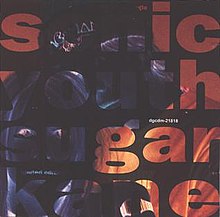This article has multiple issues. Please help improve it or discuss these issues on the talk page . (Learn how and when to remove these messages)
|
| "Sugar Kane" | ||||
|---|---|---|---|---|
 | ||||
| Single by Sonic Youth | ||||
| from the album Dirty | ||||
| B-side | "The End Of The End Of The Ugly" multiple | |||
| Released | February 1993 | |||
| Recorded | 1992 | |||
| Genre | Alternative rock | |||
| Length | 5:56 | |||
| Label | DGC | |||
| Songwriter(s) | Kim Gordon, Thurston Moore, Lee Ranaldo, Steve Shelley | |||
| Producer(s) | Butch Vig, Sonic Youth | |||
| Sonic Youth singles chronology | ||||
| ||||
"Sugar Kane" is the third single from Sonic Youth's 1992 album Dirty . It was released in 1993 on DGC. It was also featured in the End of Days soundtrack .